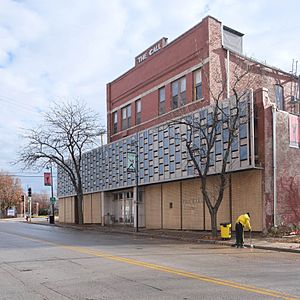The Call (Kansas City) facts for kids
| Type | Weekly newspaper |
|---|---|
| Founder(s) | Chester A. Franklin |
| Founded | May 1919 |
| Language | English |
| City | Kansas City, Missouri |
| Country | United States |
| OCLC number | 1084715622 |
The Call is a special newspaper for African Americans that started in 1919. It was founded in Kansas City, Missouri by Chester A. Franklin. This weekly newspaper still helps the black communities in both Kansas City, Missouri, and Kansas City, Kansas.
Contents
The Story of The Call
Before 1827, there were no newspapers owned and run by black people. News about black communities was often ignored or reported unfairly by other newspapers. This made it hard for people in these communities to share information. Black newspapers often faced challenges, especially with money.
Meet the Founder: Chester A. Franklin
Chester Arthur Franklin, also known as "C.A.", started The Call newspaper in May 1919. He was born in Texas in 1880. His family moved to Omaha, Nebraska and then to Denver, Colorado to find better opportunities. They were looking for a place where they would not face as much racial segregation.
In Denver, Chester worked for his father, who owned local newspapers. Chester later took over his father's paper, The Star, until 1913. He did everything from printing to editing.
In 1913, Franklin moved to Kansas City, Missouri. He had heard that many African Americans lived there and that the city had a lively culture. He wanted to start a newspaper that would reach many people in Missouri and Kansas. He opened his own printing shop first.
Franklin launched The Call and sold copies for 5 cents. His mother helped by selling subscriptions door-to-door. Franklin taught himself how to use a special printing machine called a Linotype machine. White workers were not allowed to help black people learn this skill.
The Call grew to be one of the biggest African-American weekly newspapers in the country. It also became one of the largest black-owned businesses in the Midwest. The newspaper hired many African Americans in Kansas City, and it still does today.
Franklin's Big Idea for The Call
Franklin wanted The Call to be a newspaper that gave a voice to the black community. He wanted it to be honest and not just focus on exciting, untrue stories. He believed in helping the community become strong and independent. He agreed with the ideas of W. E. B. Du Bois, a famous leader.
In The Call, Franklin shared news about the local community. This included happy events like graduations and sad events like memorials. He wanted people to see their own lives and celebrations in the paper. This was important because other newspapers often ignored them.
The paper also showed advertisements for black-owned businesses. It shared local and national news from a black point of view. Franklin believed in reporting all kinds of news, even if some readers preferred only positive stories. He also covered religious life, from church events to community gatherings.
Franklin and President Harry Truman
Franklin made The Call popular across the region. Businesses also supported it with advertising. Franklin was a strong Republican who often spoke out against political corruption. However, he got along well with Harry Truman, who later became president.
Franklin admired Truman's honesty. Truman was a Democrat who supported the black community. Because of this, Franklin suggested people vote for Truman in some elections. Their good relationship encouraged Truman to strongly support civil rights in 1948.
Why The Call Matters
For over 100 years, The Call has talked about important civil rights issues. Some issues were specific to Kansas City's black community. Others were about the whole country. Franklin always encouraged black people to register and vote.
In the 1950s, The Call spoke out against city plans that seemed to keep black people separate from white people. These plans often involved building new areas that moved long-time residents out of their homes. The paper criticized these changes that broke up communities.
Schools in Kansas City were also separated by race. Lucile Bluford, a reporter for The Call, worked on this issue. She and Lloyd Gaines were both denied a chance to continue their education because of their skin color. Bluford and Franklin used The Call to fight for their rights. They also asked readers to donate to the NAACP. The Call helped empower the African-American community.
The Call always believed in reporting honestly. It was the first African-American newspaper to join the Alliance for Audited Media. This group checks how many copies newspapers sell. It was also the first African-American newspaper to join the International News Service in 1948. This meant it could get news from a major news agency.
People Who Worked at The Call
- Roy Wilkins: He was a reporter and editor from 1923-1931. He later became a leader of the NAACP.
- Frank A. (Fay) Young: A pioneering African-American sportswriter. He was an editor for The Call from 1934-1937.
- William L. Fambrough: A photojournalist whose work is famous in Missouri.
- Ada Crogman Franklin: Chester A. Franklin's wife. She became the newspaper's president and publisher after he passed away in 1955.
- Lucile Bluford: A reporter and managing editor. She fought against segregation and became part-owner and head of The Call after C.A. Franklin died.
- Donna F. Stewart: She was a reporter and managing editor from 2001-2020. She became the publisher in 2003.
- Eric L. Wesson Sr.: He became managing editor and publisher in 2020. He works to make sure the paper is the voice of the community. He also helps people returning to society after being in jail.
 | Bessie Coleman |
 | Spann Watson |
 | Jill E. Brown |
 | Sherman W. White |


